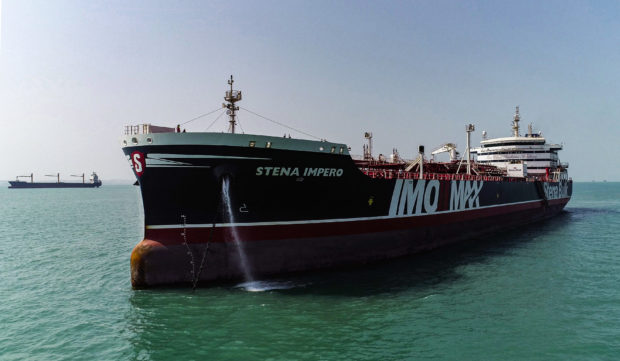Released tanker with 1 Filipino, 15 other crew reaches Dubai coast

This picture taken on September 27, 2019 shows the British-flagged oil tanker Stena Impero as it leaves Bandar Abbas port in southern Iran. (AFP)
DUBAI, United Arab Emirates–The British-flagged oil tanker Stena Impero, which had been held off the Iranian port of Bandar Abbas for more than two months, set sail Friday and arrived off the coast of Dubai, according to authorities and a tracking website.
A Filipino, along with 15 other crew members, is onboard the ship that had been held off the Iranian port of Bandar Abbas since July 19.
The ship’s seizure was widely seen as a tit-for-tat move after authorities in the British overseas territory of Gibraltar detained an Iranian tanker on suspicion it was shipping oil to Syria in breach of EU sanctions.
Tehran repeatedly denied the cases were related.
Aside from the Filipino, 13 Indians and two Russians were aboard the released ship.
Article continues after this advertisementPhilippine Ambassador to Iran Wilfredo Santos “conveyed to Iranian authorities the appreciation of the Philippine government for releasing the said Filipino crew member, who is the Second Officer of the Stena Impero, and ensuring the safety and well-being of all crew members of the Stena Impero.”
Article continues after this advertisementErik Hanel, CEO of Stena Bulk, the Swedish company that owns the vessel, said it was “obviously a relief” and added that the priority now was those on board. The crew will be repatriated from Dubai.
“When we reach Dubai we will firstly take care of the crew and then try and get the ship in operational order again,” Hanel said.
The vessel arrived off the coast of Dubai shortly after midnight local time (2000 GMT), and was stopped in the busy waterway, according to MarineTraffic.com, a ship tracking website.
‘Safe and in high spirits’
The tanker’s crew are “safe and in high spirits” and arrangements have been made for them to return to their families upon arrival in Dubai, Hanell said in a statement sent earlier.
“The crew will have a period of time to be with their families following 10 weeks of detainment on the vessel. Full support will be offered to the crew and families in the coming weeks to assist with their recovery,” he added.
The company did not release the names of the crew members.
Iran’s Revolutionary Guards seized the vessel in the Strait of Hormuz on July 19 after surrounding it with attack boats and rappelling onto its deck.
It was impounded off the port of Bandar Abbas for allegedly failing to respond to distress calls and turning off its transponder after hitting a fishing boat.
Seven of its 23 crew members were released on September 4.
British Foreign Secretary Dominic Raab said the tanker was “unlawfully seized by Iran” as part of its attempts to “disrupt freedom of navigation”.
Gulf tensions
Tensions have risen in the Gulf since May last year when President Donald Trump unilaterally abandoned a 2015 nuclear deal between major powers and Iran and began reimposing crippling sanctions in a campaign of “maximum pressure”.
They flared again this May when Iran began reducing its own commitments under the deal and the US deployed military assets to the region.
Since then, ships have been attacked, drones downed and oil tankers seized.
In June, US President Donald Trump called off air strikes against Iran at the last minute after the Islamic republic’s forces shot down a US drone.
This month, twin attacks on Saudi oil infrastructure, which knocked out half the kingdom’s production, drew accusations of blame not only from Washington, but also from its European allies.
Tehran has denied any involvement in the attacks which were claimed by Iran-backed rebels fighting a Saudi-led coalition in Yemen.
The US has since formed a coalition with its allies Australia, Bahrain, Britain, Saudi Arabia and the United Arab Emirates to escort commercial shipping in the Gulf.
Tehran has warned that the planned US-led International Maritime Security Construct will cause more, not less instability and has proposed a rival security plan of its own.
Speaking at the UN General Assembly in New York, President Hassan Rouhani announced a plan called “Hormuz Peace Endeavour” or “HOPE”.
He gave no details but called on all of Iran’s Gulf neighbors to join, saying: “Security cannot be provided with American weapons and intervention.”
Foreign Minister Mohammad Javad Zarif tweeted Thursday that the plan calls for “dialogue, confidence-building, freedom of navigation, energy security, non-aggression, non-intervention.” Agence France-Presse with report from INQUIRER.net